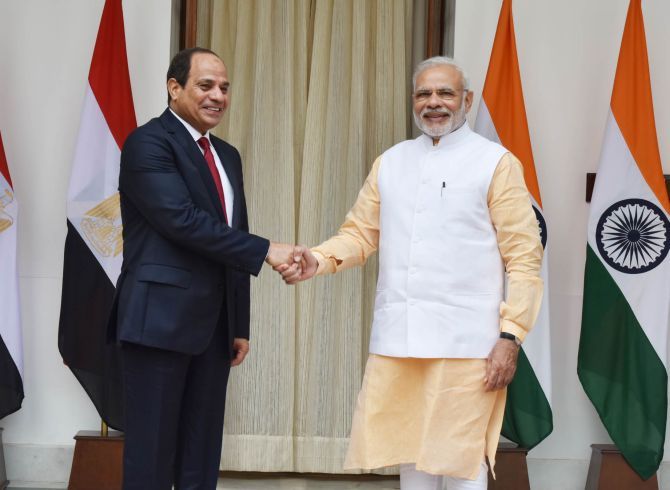
Signalling a major shift in ties, India and Egypt on Friday decided to step up their overall defence and security cooperation to tackle the twin challenges of terrorism and radicalisation besides enhancing economic and trade engagements.

A series of decisions to combat terrorism were taken in wide-ranging talks between Prime Minister Narendra Modi and President of Egypt Abdel Fattah al-Sisi as the two countries have been engaged in staving off the threat of extremism and radicalism.
Identifying terrorism as one of the "gravest threats", they decided to have greater information and operational exchanges, apart from ramping up defence cooperation. Both sides also inked a pact on maritime transport which will facilitate maritime commerce and transit of naval vessels.
The prime minister said the two countries agreed on an "action oriented agenda" to drive the engagements in a range of sectors while Sisi resolved to work towards a robust security cooperation with India and lay out a roadmap for intensification of trade and investment.

"President and I are of one view that growing radicalisation, increasing violence and spread of terror pose a real threat not just to our two countries, but, also to nations and communities across regions.
"In this context, we agreed to further our defence and security engagement which would aim at expanding defence trade, training and capacity building," Modi said at joint media interaction with Sisi. Modi said both sides have also agreed on greater information and operational exchanges to combat terror.
Cooperation on emerging challenges of cyber security and working together to fight drug trafficking, transnational crimes and money-laundering were other key decisions taken at the meeting.

Complimenting Sisi's leadership, Modi called him "a man of many achievements", both at home and abroad, and said "1.25 billion people of India are happy to see you here. Egypt itself is a natural bridge that connects Asia with Africa. Your people are a voice of moderate Islam."
For India, Egypt is a strategically located country which is a crucial link between northeast Africa and the Middle East. After coming to power two years back, Sisi has initiated major reforms to strengthen Egyptian economy.
On trade ties, the prime minister said it was decided to deepen cooperation in agriculture, skill development, small and medium industry and health sectors to diversify the portfolio of economic engagement.

"We recognised that strong trade and investment linkages are essential for economic prosperity of our societies. We, therefore, agreed that increased flow of goods, services, and capital between our two economies has to be among our key priorities," said Modi.
A joint statement issued after the talks said, "The two leaders strongly condemned terrorism in all its forms and manifestations. They considered terrorism to be one of the gravest threats to international peace and security. They reaffirmed their resolve to strengthen cooperation in combating terrorism at all levels.
"They also reaffirmed their resolve to work together at UN on concluding the Comprehensive Convention on International Terrorism."
In his comments, Modi said Egypt is a "factor" for regional peace and stability in Africa and the Arab world and that it always championed the cause of developing countries.

"In our conversation, President Sisi and I have agreed to build on multiple pillars of our cooperation. We agreed to sustain and strengthen the momentum of high-level political exchanges," he said calling Egypt a "natural bridge connecting Asia with Africa".
The PM appreciated the good work Egypt has been doing during its current term on the UN Security Council.
"We agreed that the UN Security Council needs to be reformed to reflect the realities of today. We also welcome Egypt's participation at next week's G20 Summit. We believe it will add value and enrich the substance of discussions at G-20," said Modi.
Calling the talks very productive, Sisi said a large number of issues ranging from tackling terror, expanding trade ties to dealing with challenge of climate change were deliberated upon, adding that there was "major conversion" of views on them.

The two leaders welcomed the recent exchanges on security cooperation and counter-terrorism at the level of National Security Advisers and the conclusion of a MoU for cooperation between the two National Security Councils.
Referring to defence ties, the two leaders welcomed deepening and expansion of defence relations through high level visits, training, exercises, transit facilities and hardware cooperation.
In the meeting, Sisi appreciated Modi's gesture of supplying 20,000 million tons of rice to Egypt at "friendship price" last month. The two leaders agreed to maintain the spirit of friendship and extend cooperation in other food items as well.
On climate change, the two leaders highlighted the importance of a global approach based on the principles and provisions of the United Nations Framework Convention on Climate Change and its Paris Agreement.

Referring to trade, the joint statement said the two leaders welcomed the expansion of Indian investment in Egypt, which is currently about USD 3 billion.
"Modi welcomed Egyptian investments in India under the 'Make in India' initiative, in the manufacturing and services sectors. President Al-Sisi invited Indian participation in the Suez Canal Economic Zone, particularly in sectors such as petro-chemicals, energy and agriculture," the joint statement said.
Sisi, who arrived here on a three-day visit, invited
Indian participation in the Suez Canal Economic Zone, particularly in sectors such as petro-chemicals, energy, agriculture, healthcare, education, skills and IT.
"The two leaders exchanged views on a number of issues of bilateral and international interest including the latest developments in West Asia and North Africa region, the spread of extremism and radicalisation and the scourge of terrorism. They also discussed the need for reform of the UN," the joint statement said.

Sisi and Modi "affirmed" the need for a comprehensive and permanent solution to the Arab-Israeli conflict on the basis of the UN resolutions, in implementation of the two-state principle on the establishment of an "independent and sovereign" PalestineState with East Jerusalem as its capital.
"They also sought a comprehensive and just solution to the Palestinian refugees' cause in accordance with resolution 194 of the UN General Assembly and the Arab Peace Initiative, in a way that preserves security, stability and peace of all the countries in the region.
"Both the leaders urged the two parties to start negotiations," the statement said, adding they also emphasized the need for cessation of hostilities in Syria and expressed concern over humanitarian crisis in the country.
They called for a comprehensive and peaceful resolution of the Syrian conflict through a Syrian-led political process and expressed strong support for the people and the Government of Iraq in their efforts to overcome the existing crisis to uphold national sovereignty and territorial integrity.
Sisi extended an invitation to President Pranab Mukherjee and Prime Minister Modi to visit Egypt at a mutually convenient time, which was gladly accepted, the statement said.










